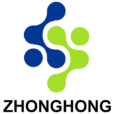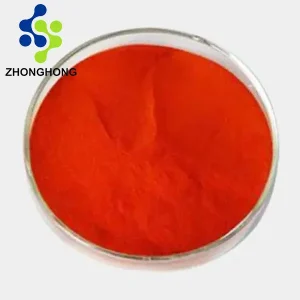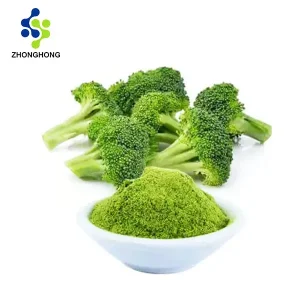Schisandra Extract (Schisandra chinensis) – High-Purity Botanical Extract for Nutraceuticals, Cosmetics & Functional Foods
GMP-Certified | OEM & ODM Factory | AIHerba® – Shaanxi Zhonghong Investment Technology Co., Ltd.
(1) Product Overview
Schisandra Extract is derived from the fruit of Schisandra chinensis, a traditional adaptogenic herb known in Chinese medicine as “Wu Wei Zi,” meaning “five-flavor berry.” It is standardized to contain bioactive lignans such as Schisandrin A, Schisandrin B, and Schisandrol A, known for their potent antioxidant, hepatoprotective, and anti-stress properties.
AIHerba® supplies high-purity Schisandra Extract produced under GMP, ISO9001, and HACCP systems, ensuring safety, traceability, and consistent quality for use in dietary supplements, functional beverages, pharmaceuticals, and skincare formulations.
(2) Botanical Source & Production Process
-
Botanical Name: Schisandra chinensis (Turcz.) Baill.
-
Plant Part Used: Fruit
-
Extraction Method: Water-ethanol extraction → Concentration → Filtration → Spray drying
-
Active Ingredients: Schisandrins, Schisandrols, Schisantherins
-
Appearance: Fine brown-yellow powder
-
Assay: Schisandrins ≥ 2.0% (HPLC)
(3) Production Process Flow
-
Raw Material Selection – Premium-grade Schisandra berries sourced from Northern China.
-
Cleaning & Drying – Removal of impurities and moisture adjustment.
-
Solvent Extraction – Gentle ethanol-water extraction to retain bioactives.
-
Filtration & Concentration – Low-temperature vacuum concentration.
-
Purification & Standardization – Ensures consistent lignan content.
-
Spray Drying & Sieving – Converts extract into stable, free-flowing powder.
-
Quality Control & Packaging – Each batch tested for purity, safety, and potency.
(4) Key Benefits & Health Effects
-
Liver Protection: Supports hepatic detoxification and helps regenerate liver cells.
-
Stress & Fatigue Reduction: Acts as an adaptogen, improving resistance to stress.
-
Cognitive Support: Enhances focus, concentration, and mental clarity.
-
Antioxidant Power: Neutralizes free radicals and reduces oxidative stress.
-
Anti-Aging & Skin Benefits: Promotes cell renewal and protects skin from UV damage.
-
Immune System Modulation: Balances immune response and supports vitality.
(5) Traditional Applications
In Traditional Chinese Medicine (TCM), Schisandra chinensis has been used for over 2,000 years to:
-
Nourish the liver and kidneys
-
Improve endurance and physical strength
-
Soothe coughing and support respiratory health
-
Restore balance and enhance longevity
(6) Recommended Dosage & Usage
-
Dietary Supplements: 250–500 mg/day (standardized extract, 2% schisandrins)
-
Functional Foods & Beverages: 0.1–0.5% in powder blends or tonics
-
Cosmetics & Skincare: 0.5–2% as an antioxidant or anti-aging active
-
Pharmaceutical Applications: Custom formulations available upon request
Consult your product development team or regulatory authority for region-specific usage limits.
(7) Specifications & COA Summary
| Category | Item | Specification | Test Method |
|---|---|---|---|
| General | Appearance | Brown-yellow fine powder | Visual |
| Odor & Taste | Characteristic | Organoleptic | |
| Assay | Schisandrins | ≥ 2.0% | HPLC |
| Moisture | Loss on Drying | ≤ 5.0% | USP <731> |
| Ash | Total Ash | ≤ 5.0% | AOAC 942.05 |
| Pesticide Residues | 500+ multi-residue screening | Complies | GC-MS/MS |
| Heavy Metals | Lead (Pb) | ≤ 3.0 mg/kg | ICP-MS |
| Arsenic (As) | ≤ 2.0 mg/kg | ICP-MS | |
| Cadmium (Cd) | ≤ 1.0 mg/kg | ICP-MS | |
| Mercury (Hg) | ≤ 0.1 mg/kg | ICP-MS | |
| Microbiology | Total Plate Count | ≤ 1,000 cfu/g | USP <2021> |
| Yeast & Mold | ≤ 100 cfu/g | USP <2021> | |
| E. coli | Negative | USP <2022> | |
| Salmonella | Negative | USP <2022> | |
| Staphylococcus aureus | Negative | USP <2022> |
(8) Storage & Shelf Life
-
Storage Conditions: Store in a cool, dry, well-ventilated area away from direct sunlight and moisture.
-
Shelf Life: 24 months in sealed packaging under recommended conditions.
-
Packaging: 1kg/aluminum foil bag; 25kg/drum (PE inner, fiber outer).
(9) Sample Policy, MOQ & Logistics
-
Samples: 20–50g free samples available upon request (shipping cost covered by buyer).
-
MOQ: 1kg (bulk order discounts for ≥25kg).
-
Lead Time: 3–7 working days after order confirmation.
-
Shipping: DHL, FedEx, air or sea freight (EXW, CIF, or DDP available).
(10) Applicable Industries & Applications
-
Nutraceuticals & Dietary Supplements – Liver health, energy, stress relief formulas.
-
Functional Foods & Beverages – Adaptogenic tonics, detox drinks, vitality beverages.
-
Pharmaceuticals – Hepatoprotective and cognitive-enhancing formulations.
-
Cosmetics & Personal Care – Anti-aging serums, skin brightening, antioxidant creams.
(11) Best Formulation Combinations
-
For Liver Health: Schisandra Extract + Milk Thistle Extract + Dandelion Root Extract
-
For Anti-Fatigue: Schisandra Extract + Ginseng Extract + Rhodiola Rosea Extract
-
For Skin Health: Schisandra Extract + Vitamin C + Ceramide NP + Hyaluronic Acid
(12) Safety & Precautions
-
Avoid use during pregnancy or breastfeeding unless supervised by a healthcare professional.
-
Not suitable for individuals with acute gastric or peptic ulcers.
-
Store out of reach of children.
(13) Certifications & Quality Assurance
-
GMP, ISO9001, ISO22000, HACCP Certified Factory
-
Third-Party Testing: SGS, Eurofins, Pony Testing
-
Compliance: USP, EP, and GB standards
-
Traceable Raw Material Supply Chain
(14) AIHerba® Factory Expertise & Capabilities
With 28+ years of R&D and manufacturing experience, Shaanxi Zhonghong Investment Technology Co., Ltd. (AIHerba®) is a leading Chinese factory specializing in natural plant extracts.
We utilize supercritical CO₂ extraction, membrane purification, and spray drying to produce high-potency, stable, and water-soluble extracts.
Our OEM & ODM services help global partners develop customized functional formulations for nutraceuticals, cosmetics, and beverages.
📧 Contact Us:
sales@aiherba.com | info@aiherba.com | liaodaohai@gmail.com
🌐 Website: www.aiherba.com
(15) Frequently Asked Questions (FAQ)
Q1: What is the standard assay for Schisandra Extract?
A1: Typically standardized to 2.0%–9.0% total schisandrins by HPLC, depending on customer specification.
Q2: Can AIHerba provide custom extraction ratios or solvents?
A2: Yes, customized ratios (5:1, 10:1, etc.) and solvent profiles are available for OEM projects.
Q3: Is this extract water-soluble?
A3: Yes, AIHerba offers both water-soluble and ethanol-soluble forms for versatile formulations.
Q4: Do you provide documentation?
A4: COA, MSDS, TDS, and third-party test reports are available with every batch.
(16) References (Scientific & Regulatory)
-
Panossian A, Wikman G. “Pharmacology of Schisandra chinensis: An overview of Russian research and uses.” J Ethnopharmacol. 2008;118(2):183–212. PubMed
-
FDA Botanical Drug Development Guidance for Industry, 2016. FDA.gov
-
National Institutes of Health (NIH): Schisandra chinensis Monograph
-
Panossian, A., & Wikman, G. (2008). Pharmacology of Schisandra chinensis Bail.: An overview of Russian research and uses in medicine. Journal of Ethnopharmacology, 118(2), 183-212. (Mechanisms, Adaptogenic Effects)
-
Lu, Y., & Chen, D. F. (2009). Analysis of Schisandra chinensis and Schisandra sphenanthera. Journal of Chromatography A, 1216(11), 1980-1990. (Analytical Methods, Lignan Profiles)
-
Nowak, A., Zakłos-Szyda, M., Błasiak, J., Nowak, A., Zhang, Z., & Zhang, B. (2019). Potential of Schisandra chinensis (Turcz.) Baill. in Human Health and Nutrition: A Review. Current Issues in Molecular Biology, 31(1), 1-24. (Comprehensive Health Benefits Review)
-
EMA. (2016). Assessment report on Schisandra chinensis (Turcz.) Baill., fructus. European Medicines Agency. (Regulatory Perspective, Traditional Uses)
-
USP-NF. (2023). United States Pharmacopeia and National Formulary. (General Quality Standards)
-
ICH Q7. Good Manufacturing Practice Guide for Active Pharmaceutical Ingredients. (GMP Standards)
-
ICH Q1A(R2). Stability Testing of New Drug Substances and Products. (Stability Guidelines)
-
Shaanxi Zhonghong Internal Research Data & Process Validation Reports. (Proprietary Extraction & QC Data – Available under NDA).
(17) Summary
AIHerba® Schisandra Extract combines ancient botanical wisdom with modern extraction technology to deliver a potent, traceable, and high-quality natural ingredient for global industries. Whether you are formulating a liver detox supplement, a stress-relief beverage, or an anti-aging skincare line, AIHerba provides the technical support, documentation, and manufacturing excellence you can trust.
Bulk Supply & Technical Support
Get direct factory quotes, COA, and MSDS within 12 hours. We support bulk supply and custom specifications.





